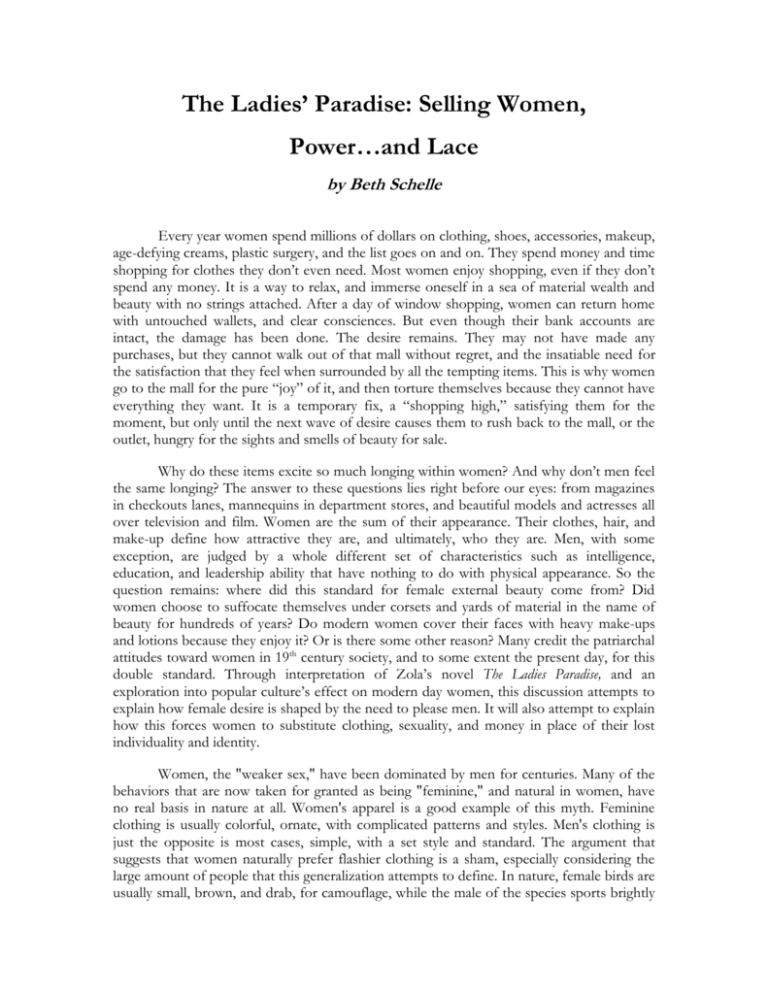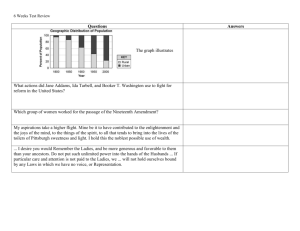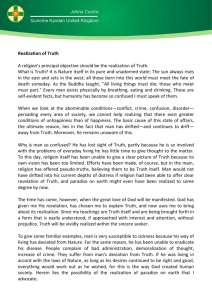
The Ladies’ Paradise: Selling Women,
Power…and Lace
by Beth Schelle
Every year women spend millions of dollars on clothing, shoes, accessories, makeup,
age-defying creams, plastic surgery, and the list goes on and on. They spend money and time
shopping for clothes they don’t even need. Most women enjoy shopping, even if they don’t
spend any money. It is a way to relax, and immerse oneself in a sea of material wealth and
beauty with no strings attached. After a day of window shopping, women can return home
with untouched wallets, and clear consciences. But even though their bank accounts are
intact, the damage has been done. The desire remains. They may not have made any
purchases, but they cannot walk out of that mall without regret, and the insatiable need for
the satisfaction that they feel when surrounded by all the tempting items. This is why women
go to the mall for the pure “joy” of it, and then torture themselves because they cannot have
everything they want. It is a temporary fix, a “shopping high,” satisfying them for the
moment, but only until the next wave of desire causes them to rush back to the mall, or the
outlet, hungry for the sights and smells of beauty for sale.
Why do these items excite so much longing within women? And why don’t men feel
the same longing? The answer to these questions lies right before our eyes: from magazines
in checkouts lanes, mannequins in department stores, and beautiful models and actresses all
over television and film. Women are the sum of their appearance. Their clothes, hair, and
make-up define how attractive they are, and ultimately, who they are. Men, with some
exception, are judged by a whole different set of characteristics such as intelligence,
education, and leadership ability that have nothing to do with physical appearance. So the
question remains: where did this standard for female external beauty come from? Did
women choose to suffocate themselves under corsets and yards of material in the name of
beauty for hundreds of years? Do modern women cover their faces with heavy make-ups
and lotions because they enjoy it? Or is there some other reason? Many credit the patriarchal
attitudes toward women in 19th century society, and to some extent the present day, for this
double standard. Through interpretation of Zola’s novel The Ladies Paradise, and an
exploration into popular culture’s effect on modern day women, this discussion attempts to
explain how female desire is shaped by the need to please men. It will also attempt to explain
how this forces women to substitute clothing, sexuality, and money in place of their lost
individuality and identity.
Women, the "weaker sex," have been dominated by men for centuries. Many of the
behaviors that are now taken for granted as being "feminine," and natural in women, have
no real basis in nature at all. Women's apparel is a good example of this myth. Feminine
clothing is usually colorful, ornate, with complicated patterns and styles. Men's clothing is
just the opposite is most cases, simple, with a set style and standard. The argument that
suggests that women naturally prefer flashier clothing is a sham, especially considering the
large amount of people that this generalization attempts to define. In nature, female birds are
usually small, brown, and drab, for camouflage, while the male of the species sports brightly
colored feathers in order to attract a mate. But it is exactly the opposite with humans. It is
the female's "responsibility" to attract potential husbands and the best way to do so is to
dress in ways men find attractive. Over the years, women have perfected the art of fitting the
male standard of beauty. Most every girl in civilized society, from infancy on, starts out life
with a healthy dose of pink lace, and from then on can rarely escape the social dictates that
force her to transform herself into the male ideal. There are many ways to achieve this
transformation, some of them expensive, some of them gruesome, but all of them employed
by women wishing to seek the approval of men and society in general. Cosmetic surgery,
breast implants, collagen injections, and liposuction are the most drastic steps that women
take, and are usually only attempted by the rich and extremely insecure. But for the common
everyday woman, with a morning ritual of cleansers, astringents, tweezing, shaving, and
make-up, everyday is a battle. For a woman to compete in the job and marriage markets,
certain standards of appearance must be observed. The male idea of a beautiful woman must
be attained in order to succeed in a patriarchal society such as ours. Sometimes this desire to
please is, at worst, only confining; but sometimes it is exploited by men in order to bend
women's wills for their own ends.
Mouret, in The Ladies Paradise, uses his powers of seduction to exert absolute control
over the desires of his female customers. His whole store is a lovely mirage, designed to melt
all the pecuniary inhibitions away from the women shoppers who frequent the store. His
power lies in his ability to make them desire the goods, that is where his real "business
sense" lies. In one scene that takes place in Madame Desforge's house, Mouret is seen
surrounded by a panting gaggle of women, all in a flurry to know what styles his store will be
setting the next season, so that they will know how they are supposed to dress. "They had
ceased to interrupt him, and narrowed the circle, their mouths half open with a vague smile,
their eager faces close to his, as in a sudden rush of their whole being toward the tempter."
(p.72). His charm obviously affects them; it is as if by buying his goods, they feel like they
are somehow closer to him, participating in his general flirtation. In reality, they are victims
of their own passion, for while they believe they are on equal footing with him, Mouret
knows that he alone holds the power, and he plays with their emotions as a cat plays with a
mouse.
One extended metaphor that Zola uses to depict the plundering of the women is the
Oriental salon, which is a representation of colonized India. The rugs and cloths, gathered by
conquerors who had "emptied the palaces, plundered the mosques and bazaars"(p. 79)
suggests the conquered women, who exit the store drained of energy and money just as
India was drained by England. The Ladies’ Paradise, though, it is not the English who have
conquered, it is Mouret. He has single-handedly dictated the desires of every woman who
entered his store. He has made her his own, financially and spiritually. She who falls under
his spell will never again see either her money, or her desire, for they are both taken control
of by Mouret. He is a man who seduces for the sole purpose of gaining money and power.
So for Mouret, the women no longer have any individuality. They melt into one generality,
their worth measured in francs. They cease to be women, and become merely sources of
easy cash.
In many ways, Mouret and Bourdoncle scorn the women, even as they are filling
their pockets with the money they weasel from them. To the women, the store is a temple
erected for the sole purpose of supplementing the natural beauty of women. Mouret and the
other shop-men, with their flattery and pretty words, further this illusion.
They cajole and caress the women into thinking that the items are exactly what they
needed, even if they came in simply to look. But in reality, it is all a farce, and the women are
played like instruments by the men in an attempt to weasel money out of them. The women
gage what to buy through the level of flattery shown to them by the male shopkeepers. One
shopper even comments to her companion while being served, "Don't you prefer to be
served by men? One feels more comfortable"(p. 101), showing that women feel more sure
of their purchases when a man is there to cajole and flatter them into the purchase. Even
Mouret and Bourdoncle enter into this deceiving flattery with the customers. Disgusted by
the ease with which the women are fooled, Bourdoncle despises women because of their
weakness to flattery, "he treated them with the disdain of a man without passion, whose
trade is to live on them…"(p. 293). He loves them only for their money.
Another result of the men's ability to dictate what is desirable to the women, is the
way that the goods come to represent femininity, so that whatever the price, the women
must obtain them. Zola writes of "selling woman by the pound"(p. 69) and he is right. The
women will do anything to have the goods that tempt them so. And the very reason the
goods are so tempting is that they promise reaffirmation of femininity to any woman who
might need encouragement. In order to feel beautiful and desirable, she could buy a lace
cravat, or a pair of crisp white gloves, and feel renewed. But, again, she is purchasing
femininity for a price, therefore reducing herself and all women to a bit of lace, a piece of
silk. And this, moreover, creates constant competition between the women, seemingly over
the limited supply of Paris Paradise, but in reality, over the limited supply of male approval.
For the shop-girls in The Ladies' Paradise, every workday is a battle against each other.
Constantly competing with each other for customers and the attention of Mouret, they
create a hostile working environment. Each must dress correctly and look a certain way in
order to succeed. The best way to ensure that success is to be appealing enough to attract the
attentions of Mouret, so that sexual favors can be exchanged for the right to be lazy at work,
as Clara Prunaire does. She becomes his "kept woman" and, while she can keep him happy,
is protected from termination for any laziness or wrong doing.
Clara is not the only woman who sells her body, though. Many women of the time
had to supplement their incomes with cash earned in the streets from men who took care of
them financially in exchange for sexual relations. Mouret himself, the greatest seducer of
them all, also sees women as "affection bought and paid for"(p. 334), seeing them no more
than "agreeable pastimes, frequently a calculation, in which he sought nothing but a
profitable pleasure"(p. 281). Since most of the women sell themselves, Denise is also
encouraged to get rid of her money troubles by taking a "gentleman companion." She, being
a virtuous girl, refuses this and pays dearly for it. When she rebuffs Jouve's advances in the
basement, he rats her out for talking with her brother and succeeds in getting her fired,
another example of women being punished for denying men.
Their backs against the wall, the women reduce their own worth down to francs by
selling their bodies, and purchasing their femininity from the store in the form of clothing
and accessories. In the end, that is their true importance to the men, and to the store.
Lacking strong wills and desires of their own, they must take what they are given by the men.
And what are they given? Clothes, knick-knacks from Japan, fancy umbrellas, and many
other useless articles. Cold comfort they may be, but these useless articles are the women's
only way to find some identity, some way to distinguish themselves. Each woman surveys
the store, looking for the perfect vase to set in her drawing room that will produce an effect
that she can be proud of, that she can feel is an illustration of herself, her identity. For the
most part, the women see themselves in the clothes they buy. Their hands are not hands
until encased in delicate gloves, their waists are not waists until crushed into the right shape
and covered by layers of cloth. The goods come to represent, in an almost literal way, the
female body. In one passage, the white goods of the Great Sale are described to great effect
as a bride, in all her chaste nakedness, "The silk department was like a great chamber of love,
hung with white by the caprice of some snowy maiden wishing to show off her spotless
whiteness. All the milky tones of an adored person were there, from the velvet of the hips,
to the fine silk of the thighs and the shining satin of the bosom"(p. 366). Here, the cloth
becomes the female body, virginal and clean. The women, searching for a way to reclaim that
pure state they once possessed, eagerly buy everything in sight. But clothing is a poor
substitute for freshness, because, after it is worn, it loses its newness, the charm is broken,
and the women must again empty their purses in the attempt to buy back their lost virginity.
Another strikingly desolate example of how women's femininity is replaced by the
goods is Genevieve Baudu. She is a fixture of her father's store, a commodity that, like the
store itself, is passed down from one man to the next, generation after generation. She is
chattel, first the property of her father, and then her husband, but always in conjunction with
the store. Whoever owns the store owns her as well. As the Old Elbouf is slowly destroyed
by the Ladies’ Paradise, Genevieve, too, wastes away. It is as though she does not exist
unless the store does; she has no importance to the world, or to Colomban, without it. Zola
uses her deeply moving story to drive home the full impact of how devastating society's
treatment of women was in the 19th century. With Genevieve, he shows with poetic force,
the disastrous effects of linking a woman's life so closely with something material, something
that is owned, and unfortunately, something that can be destroyed. When the Old Elbouf
finally dies, a victim of its own resistance to progress, Genevieve also dies, a victim of the
attitudes that considered women no more than property.
As the women equate the goods more and more with their own bodies, and their
own femininity, it becomes harder and harder to resist them. Madame Marty, whose
husband barely makes enough at his work to support his family, nearly ruins him because of
her inability to resist the goods. She, and the other customers, come to see the clothing as
their own sexuality, which they transfer from themselves and their husbands, onto the actual
goods of the store. So, in a sense, the women "desire" the clothes sexually. Many
descriptions of the goods sound like descriptions of the female physique, and so Zola
intends the reader to see just how much the women "need" the clothes they buy. For them,
it is a way to gain control over their own sexuality. Madame De Boves, especially, is affected
by the sexual pull of the fancy goods, and derives intense gratification by merely touching a
piece of expensive lace, made all the more desirable by the fact that she cannot afford it.
The counter was covered, she dived her hands into this increasing mountain of lace, Malignes,
Valenciennes, and Chantilly, her fingers trembling with desire, her face gradually warming with a sensual joy;
whilst Blanche, close to her, agitated by the same passion, was very pale, her flesh inflated and soft. (p.98)
To Madame De Boves and her daughter, the lace is sexually very desirable, and they
are quite unable to resist it. At some point, driven to distraction by merely feeling and
looking at the merchandise, Madame De Boves begins to steal pieces of lace, ribbons, and
other valuables. She stuffs them under her dress, sated by the feel of them against her skin,
knowing that she finally has possession of them. Many of the women steal from the store
and soon the Ladies’ Paradise actually breeds a new kind of criminal: the kleptomaniac.
Driven by the need to at once both own the goods, yet at the same time to feel that they had
robbed the tradesman who dares to keep them from their own sexuality, the women steal
ridiculous amounts of useless objects. One woman even goes from store to store, stealing
huge amounts of pink gloves, driven by some insatiable desire. Mouret, realizing this need of
theirs, "all the greed felt by women, whose enjoyment as buyers is doubled when they think
they are robbing the tradesmen"(p. 73), plays upon it. His success comes largely from the
fact that he sells his cloth below cost price. But still, his real power lies in his possession of
the hearts of all the women; his seduction of them completes his triumph.
Mouret claims, as the key to his success, that he knows the hearts of women through
and through, divines their secret longings and uses them for his benefit.
…Mouret still remained their master beneath the rapture he affected. He seemed to be a woman
himself, they felt themselves penetrated and overcome by this delicate sense of their secret that he
possessed, and they abandoned themselves, captivated; whilst he, certain from that moment to have
them at his mercy, appeared, brutally triumphing over them, the despotic monarch of dress(p.75).
This "secret" of theirs that Mouret possesses is his knowledge of what they desire.
He knows that the women equate soft, pretty, delicate things with femininity, and desirability
for men. And he also knows how to guide them toward their own desires without their even
knowing it. His physical attraction and his sexuality, are his trump card, and he uses it to
make them do exactly as he wants. By playfully flirting with them, and waiting on them with
the devotion of a pet dog, he convinces them that he is under their control, and subject to
their whims. They believe that his mission is to wait on their pleasure, and furnish them with
all the womanly accoutrements that they need. They believe that the store is a temple
devoted to the worship of Woman, "they felt there a continual caress of flattery, an
overflowing adoration, which detained the most dignified and virtuous woman"(p. 188).
Here Mouret succeeds, for his success depends on their feeling as though they are in control.
The reality is quite the opposite though, for it is Mouret, and men in general, who control
the women's desires. Mouret is blissfully aware of this deception, and in fact, furthers it with
his practiced flattery, "His sole aim was to intoxicate her with gallant attentions, and traffic
on her desires, work on her fever"(p.208).
Mouret becomes so powerful, in fact, that Zola goes so far as to make a god out of
him; a god of women. While they believe that Mouret is worshipping them, it is really they
are who are worshipping him, "The laces alone retained a snowy reflex on the dark tresses of
the ladies, of which the confused group seemed to surround the young man [Mouret] with a
vague appearance of kneeling, worshipping women"(p. 76). He is their undisputed ruler,
exercising more control over them than even their own husbands. And since Mouret is the
"God of Dress,” the Ladies’ Paradise is his temple, raised to the worship of female
desirability. Refurbished, complete with velvet lined lifts, a refreshment bar, picture gallery,
and reading room, it is a world unto itself; so complete that the women could not only shop
there for hours, but they never need leave. Some of them spend entire days there, in the
beautiful, feminine atmosphere, drinking ices and writing letters. They feel so at home and in
control while there, that the store takes on a whole new meaning for them. It becomes
almost a religion. With Mouret, the god of it all, presiding over the conquered masses of
women. The Ladies’ Paradise, his temple, is "a sort of new religion” and “the churches,
gradually deserted by a wavering faith, were replaced by this bazaar, in the minds of the idle
women of Paris"(p. 378). According to Zola, the "wavering faith" of the women was the
direct result of the patriarchal church's contempt for women. Women of the time were often
used as scapegoats by priests and other male leaders in the church for the sexual sins
committed by men. They were often called "temptresses" or "witches" who ensnared men
into sexual promiscuity or philandering with the beauty of their bodies. They shouldered
most of the blame for all crimes of a sexual nature, and so were taught to see their bodies as
dirty and shameful. Hence the layers of clothing that the women wore in order to cover up
their bodies and hair, and the taboos surrounding any "intimate" part of the female body,
such as the ankle or calf, to be seen in public. This constraining and hateful atmosphere that
existed in many churches, says Zola, caused women to spend the "shivering and anxious
hours they formerly passed in churches"(p. 378) in the Ladies’ Paradise. After all of this
persecution and blame that the women had to endure simply for being women, the Ladies’
Paradise was a paradise indeed, a temple set up for the worship of the female body. This
"religion of the body" allowed women to feel love for their own sexuality and bodies, and
even though it was still Mouret and men in general who controlled their desire, at least it was
a momentary escape from the shame previously associated with their bodies.
The "God of Dress" even replaces the husbands of the women who shop at the
Ladies Paradise. In the home, their husbands have all the power, but in the Paradise, the
women reign supreme. Madame Marty, even though her husband entreats her to use
economy, spends uncontrollably in her desire to own a little piece of the feminine essence
that the store sells. It becomes a battle, a "growing struggle of the God of Dress against the
husband"(p. 378): and the store wins. How could it not when it offers the women what they
most want: control over their own bodies? If it is only an illusion of control, the women do
not realize it, and they happily remain Mouret's faithful slaves.
The only power the women have, the only thing they can wield as a weapon against
the control of the men, is their virginity. Men want it, and will do anything to get it. Across
cultures and timelines, a woman's virginity has remained her most precious commodity. In
Japan, men pay king's ransoms for the opportunity to "buy" the maidenhead of a young
geisha, and in today's society, it is considered a rare and precious thing for a woman to be
"truly able" to wear white on her wedding day. All of the women who shop at the Ladies’
Paradise are there, at least in part, to try to regain some of that virginal freshness by
purchasing new goods that will make their femininity more powerful. The huge white-sale
plays on this desire by creating a "bridal chamber" that reminds the women of their lost
innocence, and goads them on to buy article after article in an attempt to capture some of its
purity. Indeed, it is from her virginity that Denise derives all of her power. Mouret drools
over her naïve simplicity and virginal bloom, and decides that he must possess her. She
refuses. From then on it is a battle between the two, Mouret and Denise. He attempts to win
her over with money and power, but she is determined not to be bought and sold like the
other women around her. In this way she retains both her virginity and her self respect.
Slowly, by driving Mouret crazy with "love" for her, she gains power in the store, gaining
even the respect of the scornful Bourdoncle, who acknowledges her supreme power over
Mouret. He even begins to fear her, as prehistoric men feared the matriarchal goddesses of
death and fertility that demanded male flesh for the fertilization of the earth.
… Bourdoncle could never catch sight of her, with her clear eyes, sweet face, and simple attitude,
without being seized with a real fear, as if he had before him some disguised female flesh-eater, the
somber enigma of woman, Death in the guise of a virgin.(p. 293)
Thus, for Denise, virginity becomes synonymous with power, and she uses it to its
fullest extent. At her insistence, Mouret makes many improvements in the treatment of the
staff, and the living conditions of the women who board there. She also makes it possible for
women to go on maternity leave, a triumph for the working woman of the time. Yet even
after gaining all of this from Mouret; even though she knows that he loves her anyway, she
decides to throw down her arms, leave the battlefield, and marry him.
Does Denise lose all of her power by marrying Mouret? Or will she still be as
influential with Mouret after she becomes his wife? Zola never answers these questions
directly. But, judging by the rest of the text, Mouret’s ability to get anything out of women
and make them believe it was their choice is almost genius. It could be that Denise is just
another victim to Mouret’s power, even though she held out longer than the women before
her. In this case they are both doomed, for there is little chance for happiness or mutual
respect in a relationship where one party holds all of the power. On one hand, the master in
the relationship is cursed with making all the decisions, and taking the blow if one of those
decisions fails, a position of high stress and little reward. On the other hand, the person
being controlled has no power over his or her own life, and must always bend to the will of
the master, suppressing their own desires. In short, a union with unbalanced power structure
is one in which both parties suffer.
In fact, Zola seems to have little faith in the health of male/female relationships in
general. He seems to regard the battle of the sexes with a resigned yet scornful air.
Throughout most of the novel, men and women are in a constant struggle for power, using
either money or sexuality as weapons. Zola is not advocating the women’s movement, with
Denise as the poster-child, at all. She is merely another example of the way women use their
sexuality as power. And Mouret is the example of how men use women’s desire to please as
a way to control them. Zola leaves us with the uncomfortable feeling that Denise and
Mouret’s relationship, shallowly based on lust and power, is the societal norm. It is as good
as relationships get, and until we realize the motivations behind its problems: inequality, lust,
and power struggle between the sexes, the inherent inequality of male/female relationships
will never be balanced out.
From Zola’s time to the present, there have been many changes in the social
structure. Women have gained ever increasing ground both in the home and in the work
force. But the mania for physical perfection remains an integral part of our society, and we
may be taking steps backward even as we take steps forward. It is true that modern women
no longer wear corsets in order to appear thinner and more shapely, and this can be seen as a
triumph. But at the same time, hundreds of thousands of young women suffer from anorexia
nervosa or bulimia as a result of society’s pressures to fit the ideal feminine image. Popular
culture including Disney films, teen magazines, and Barbie dolls, portray women in the same
tired, old formula decade after decade: that of the vulnerable, beautiful, woman who depends
on her prince for acceptance, fulfillment, and power. Physical beauty remains women’s most
precious asset, whether in the work place, or the dating pool. As long as magazines,
television, and advertisement promote the idea that all women must look like a model in
order to be beautiful, women will never be able to feel secure in themselves, and they will
never feel as though they have worth in society. As long as women are judged for their
physical appearance and sexual desirability instead of their moral and intellectual qualities,
few women will ever be able to have a healthy image of themselves, much less an equal
relationship with a man.








